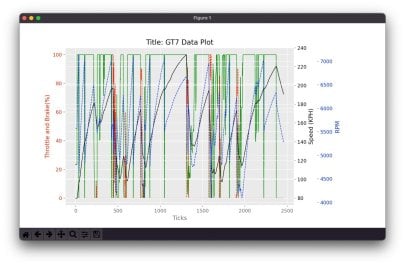- 129

- Sweden
- Bornhall
Suggestion, check bit 0 and 3 of 0x8E, I think you could use bit 0 and 3 to more or less start and stop logging (bit 0=1 and bit 3=0 seemingly means entered race, and is out on track). With some logic, you should be able to listen for bit 0 to change from 0 to 1, and first time bit 3 switches from 1 to 0 (don't take my word for this) it should mean car enters the track proper for first time after "enter track". When bit 3 switches to 1 it looks to me like it's in pit lane, so could possibly pause the logging and restart again when bit 3 switches back.It can be started/stopped
Just me thinking out "loud" here









